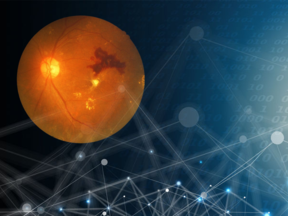Deep learning model detects diabetic eye diseases accurately

A new deep-learning trained tool can detect how serious two diabetic eye diseases are by looking at photographs of the inside of a patient’s eye. The research findings, published in Nature Scientific Reports show the tool can accurately guess the severity of diabetic retinopathy, and macular edema. Diabetic retinopathy is one of the most common symptoms of diabetes that can lead to severe vision loss if left untreated. Macular edema refers to swelling under a specific part of the retina caused by diabetic retinopathy.
The deep learning model identified referable diabetic retinopathy comparably or better than presented in previous studies, although only a very small data set of 29 000 images was used for its training. The model turned out to be more accurate in identifying diseases when the training images of back of the patients’ eyes were of high quality and resolution.
“The deep learning model could process the images automatically, and thereby either support the work of the medical doctors or identify the diseases more independently”, says researcher Jaakko Sahlsten.
Results suggest that such deep learning system could increase the cost-effectiveness of screening and diagnosis and that the system could be applied to clinical examinations requiring finer grading.
”Currently, doctors use classification systems and their personal experience to decide if a patient needs a referral to a specialist when analyzing the images of their patient’s eyes. This process has strict guidelines in the terms of accuracy, at least in Finland and in the UK, which the model is able to surpass with a high margin” says researcher Joel Jaskari.
Currently, retinal imaging is the most widely used method for screening and detecting retinopathy, and medical experts evaluate the severity and the degree of retinopathy in people with diabetes based on images of the patient’s eyes.
Diabetes is a globally prevalent disease and the number of patients with diabetes is rapidly increasing. As the number of patients increases, so too will the number of retinal images which need analysis. It is hoped that an automated system that would either assist medical experts or work as a full diagnostic tool could alleviate the situation.
“The high quality image archives of the Finnish healthcare system have enabled this work and encourages us to study the applicability of artificial intelligence-based approaches to diabetes-related and non-diabetic diseases and complications”, says Professor Kimmo Kaski.
The research group consisted of researchers from Aalto University Department of Computer Science, Finnish Center for Artificial Intelligence FCAI and medical doctors from Digifundus Ltd – a Finnish provider of diabetic retinopathy screening and monitoring services –, and Central Finland Central Hospital.
Link to the research article: https://doi.org/10.1038/s41598-019-47181-w
Further information
Read more news
Soil Laboratory Exhibition – Exploring the Dialogue Between Human and the Earth in Utsjoki
Soil Laboratory explores the relationship between humans and the earth as a living landscape through ceramic practices in Utsjoki.
The Finnish Cultural Foundation awarded grants for science and art
A total of 15 individuals or groups from Aalto University received grants
Environmental Structure of the Year 2025 Award goes to Kalasatama-Pasila tramway
The award is given in recognition of meritorious design and implementation of the built environment. Experts from Aalto University developed sustainability solutions for the project.






